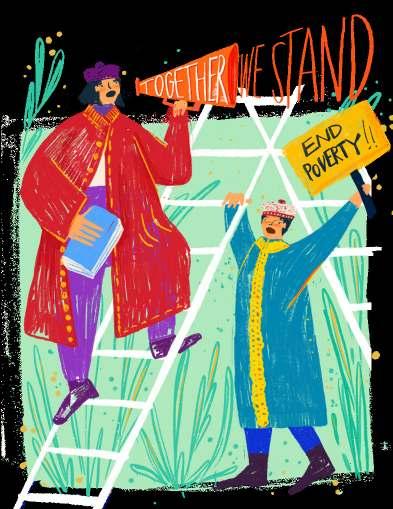
2 minute read
The Women2030 program’s results over 4 years
local Governor’s office initially refused to share information and engage with the team. In 2019, Munkhzul finally found the avenue to share the findings and recommendations of her team’s research at the National Dialogue on the “Sustainable Development Goals and Our Participation”, held in Ulaanbaatar. Representatives of local authorities and decision-makers attended the National Dialogue and were able to respond to the recommendations made by her team. The work was well-received, and she was invited as a guest speaker on local TV. Encouraged by her team, she decided to accept the invitation. She was so proud when other community members told her they saw her live: she felt like a whole different person when speaking on TV! Since then, local authorities and community members understood her team’s work better and started supporting the initiatives. The Governor of the Dornod province proposed to her to run as the Citizen’s Representative of Khural. She ran for the local election in October 2020 and, although she didn’t win a seat, the whole experience was very gratifying for her. With financial support from the Better World humanitarian organization and the Red Cross, Munkhzul’s team has now received land permission from the Governor to build a Community Development Centre. Currently, they’re planning to establish two to three workplaces at the center to contribute to decreasing poverty in their soum. During the pandemic they farmed the newly-granted land and provided impoverished people with fresh vegetables.

Advertisement

The most important thing that I learned participating in the Women2030 program is the power that comes when people can take part in the development of their communities and the importance of expressing people’s needs to the local authorities in a strategic way. I also understood that the work isn’t only that of demanding from the local authorities. We can also contribute new understandings around the Sustainable Development Goals. We carried out research that can support many different stakeholders, including local government officials and people in neighboring villages”.
Sarankhukhuu Sharavdorj Munkhzul’s story highlights traditional gender stereotypes as root causes of gender inequality. The story stresses how gender stereotypes limit women’s visibility and political participation. Global frameworks aimed at advancing women’s political participation and programs that strengthen women’s leadership and civil society feminist movements can contribute to tackling these root causes.
Munkhzul’s story is an example of how the Women2030 program supported women to develop their leadership. The Partners implementing the Women2030 program proposed various activities to develop women’s capacities to recognize their aspirations and work towards them. Practically, this took on different forms. You will read a few more examples in this booklet, such as: providing training on women’s rights and gender equality; supporting the creation of incomegenerating activities; enabling the establishment of women-led forest protection groups; delivering awareness-building on global development frameworks such as Agenda2030 and the SDGs.
When women can channel their own power, they become more comfortable navigating power structures. Women2030 Partners placed a strong focus on confidence-building activities. Women channelled this confidence in their unique ways to develop their potential. For example, they became more independent in their own families, set up income-generating activities, or acted as leaders in their communities.
AREAS Of IMPACT: Capacities Built, Policies improved.



